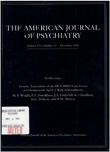Use of minor tranquilizers and antidepressant medications by depressed outpatients: results from the medical outcomes study
Abstract
OBJECTIVE: The purpose of this study was to compare use of minor tranquilizers and antidepressant medications by depressed outpatients across different treatment settings. METHOD: The study subjects were 634 patients with current depressive disorder or depressive symptoms who visited general medical clinicians, psychiatrists, psychologists, or other therapists. Data on use of medication in different types of clinical practices with different types of payment plans were gathered from structured interviews by study clinicians and from surveys of patients. RESULTS: Of the depressed patients, 23% had recently used an antidepressant medication and 30% had used a minor tranquilizer. The level of use was similar for different types of depression. Patients of psychiatrists were the most likely to use medications. In the practices of physicians, but not nonphysicians, the more severely distressed patients were more likely to use antidepressant medications. Of the patients taking an antidepressant medication, 39% used an inappropriately low dose. Patients in prepaid health care plans were twice as likely as those in fee-for-service care to use minor tranquilizers. CONCLUSIONS: Less than one-third of the depressed outpatients used antidepressant medications, and the probability of use was similar for major depression and other types of depression for which efficacy is less well established. Use of antidepressant medications among patients of nonphysicians was unrelated to the level of psychological sickness, suggesting the need for more cooperation among provider groups. Minor tranquilizers were used more often than antidepressants, particularly among patients in prepaid plans, despite controversy over their efficacy.
Access content
To read the fulltext, please use one of the options below to sign in or purchase access.- Personal login
- Institutional Login
- Sign in via OpenAthens
- Register for access
-
Please login/register if you wish to pair your device and check access availability.
Not a subscriber?
PsychiatryOnline subscription options offer access to the DSM-5 library, books, journals, CME, and patient resources. This all-in-one virtual library provides psychiatrists and mental health professionals with key resources for diagnosis, treatment, research, and professional development.
Need more help? PsychiatryOnline Customer Service may be reached by emailing [email protected] or by calling 800-368-5777 (in the U.S.) or 703-907-7322 (outside the U.S.).



